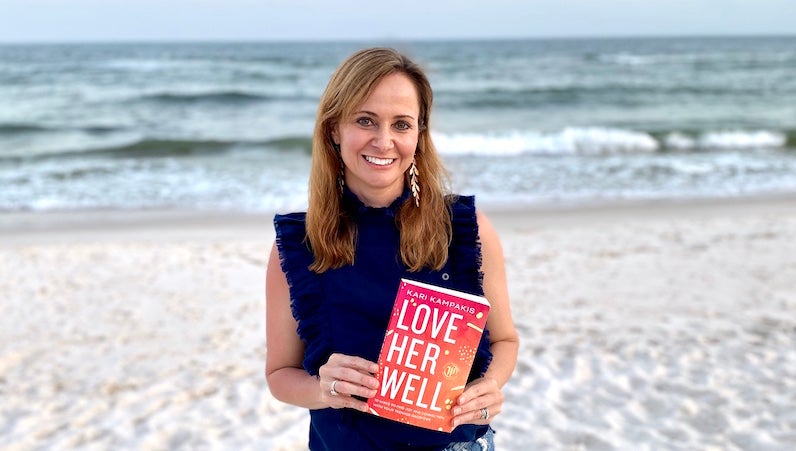The biggest thing Kari Kampakis remembers about her mom is how she loved her children well.
And though her mom passed away earlier this year, her legacy lives on through her grandchildren and children, and now in Kari’s new book on parenting teenage girls. Love Her Well: 10 Ways to Find Joy and Connection with Your Teenage Daughter made its debut in August and is now available everywhere books are sold. To learn more about the heart behind it, we chatted with Kari this summer.
Can you recap the story of how this book came to be?
In the summer of 2018, I had a mother-daughter speaking event in Opelika—which is Auburn territory, and the last place I expected to have an epiphany since I am a lifelong Bama fan. I had been giving this talk for years called “10 Ways to Love a Teenager” where I shared some personal mom fails that always led to good conversations. Afterward this woman walked up and told me, “That needs to be your next book!” She was so certain, and it was definitely a lightbulb moment, a topic I knew I could write about and talk about all day.
What did you think this book would offer that wasn’t in the market?
It’s positive yet realistic. There are a lot of books about raising teenagers, especially teenage girls, and on the covers the girls have their arms crossed and look angsty, which feeds into a stereotype. I knew there was a market for a book like this, a book to help moms finish strong in their daughters’ final years at home, and I felt so strongly about the message that I decided I would self-publish if there wasn’t publisher interest.
And then what happened?
I spent eight months writing the manuscript, and then in the summer of 2019 my agent pitched the book proposal to publishers. Thankfully, we had a very enthusiastic response, and I found it interesting that every interested publisher said, “I have a daughter, and this book not only speaks to me professionally but also personally.” We chose a boutique publisher within Thomas Nelson called W Publishing, and they are launching the book as my oldest daughter starts her senior year of high school. She was in seventh grade in the opening story of the book where we are fighting, and we have had the best five years since then. I am so glad I did not stay in that place of thinking the teenage years are just a season to “survive.”
How did the name and cover come about?
The publishing team suggested Love Her Now, and then I suggested Love Her Well. Since then I have gone back to speeches and articles I have written over time and realized how I’ve used that phrase repeatedly. For the cover we went through several rounds, until my daughter Ella suggested a sunset color scheme. I woke up one morning to a mockup cover she’d drawn on Canva, and the marketing team took that and made this cover. I wanted something with the visual and emotional appeal to meet moms where they are.
How did your other books for girls lay a foundation for this one for moms?
I am so glad I wrote books for teenagers first because it forced me to remember myself at that age, and doing that gave me empathy for teenage girls. I want to help moms put themselves in their daughters’ shoes and have empathy for them. We can still give our teens advice and rules, but it’s better if we understand where they are coming from.
How do you decide when to share vulnerable stories and when to protect your family’s privacy?
If there is a story that is embarrassing, I try to make it about me and my reactions and not about my daughters. I try to share what I am learning in my journey. If there’s something I have a question about, I ask for their permission. One thing I have learned, especially with teenagers, is the importance of protecting and respecting their privacy. You don’t want to share anything with another mom or online that might make them shut down. Having to be selective with we who we confide in can make parenting teenagers a lonely season, and that’s one reason why I felt called to write this book. I am pretty connected, yet some days I feel lonely and am not sure who can help me. Moms can read this book with a small group of moms and use my stories to start conversations that allow them to protect their teenagers’ privacy and not share their personal stories.
What did you learn from the research you pair with your personal experience in the book?
One of the best resources was The Teenage Brain, which says a teenage brain is 80 percent developed, and we parents have to fill in that 20 percent gap to help them think long-term. Books by Sissy Goff and David Thomas do a great job of challenging parents while also offering a sense of hope. It’s hard to be a parent, but having research that backs up why teenagers need parental guidance helps us stay the course.
What parts of the book do you think specifically speak to this time?
Our teenagers are dealing with a darker and more complex world than what we knew as teenagers. They are juggling so much – from impossibly high expectations to a global pandemic and online learning – and this book can help moms provide the emotional and mental support that offers calm and a sense of normalcy.
What do you see that’s good in teenagers today?
They are funny and fun and have so much energy. They can change course easily, and they are not set in their ways. They are smarter and more creative than we give them credit for, and I also love their optimism and ability to find joy in the little things of life.
Can you talk some about your new Girl Mom podcast?
I love listening to podcasts, and many of my writer friends have ventured into podcasting. A good friend, Monica Swanson, started the Boy Mom podcast and suggested that I start the Girl Mom podcast. My husband agreed to handle the technical side, so we started recording last fall and launched during the quarantine. It’s been fun, and since I can’t do speaking events right now, it’s a good alternative.
This is the first of two books for moms you have signed on. Any thoughts on what the next one will be?
I’m not sure yet. My editor wants to see what resonates with readers. With my first book it was the friendship chapter that everyone found most helpful, so the following book dove into that. Something similar could happen here as well.
What feedback have you gotten from people who have read it?
The first chapter about choosing your words and timing carefully has struck a chord with early readers. A friend told me that her daughter made her dinner one night and put the forks in the wrong place. She was about to correct her daughter, but then she stopped herself and thought, “Don’t do that now. Just enjoy that she made this dinner for you.” My hope is that by sharing my mistakes and realizations, other moms will reflect on theirs and make more intentional choices.
A lot of people locally have followed your writing for the past decade. How do you think your writing and perspective have evolved over that time?
Ten years ago my oldest daughter was 7, and now she’s almost 18. I’ve had more experiences as a mom and a woman, met more people, and heard more stories that have grown my empathy and compassion. Every family is unique and has a backstory I don’t know, so I’ve learned to make fewer assumptions and give more grace. I hope that 10 years from now, I will say the same thing and be further along in this direction.











